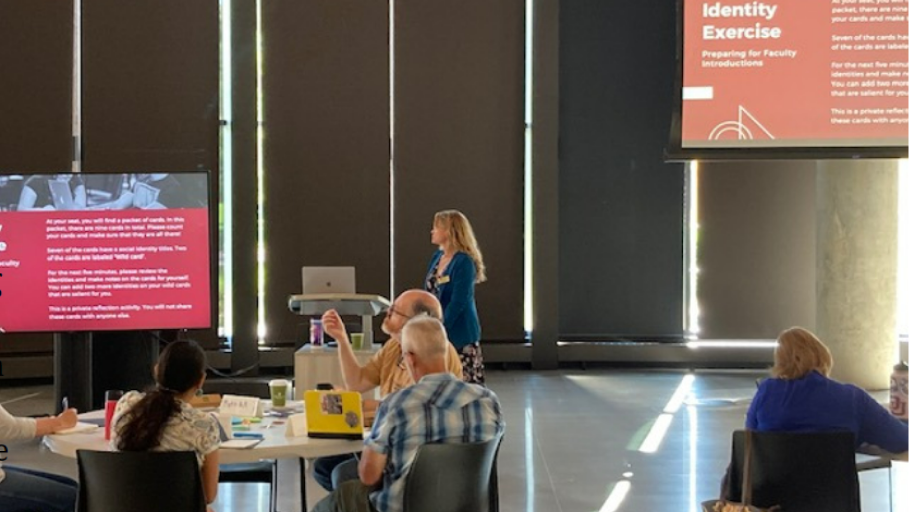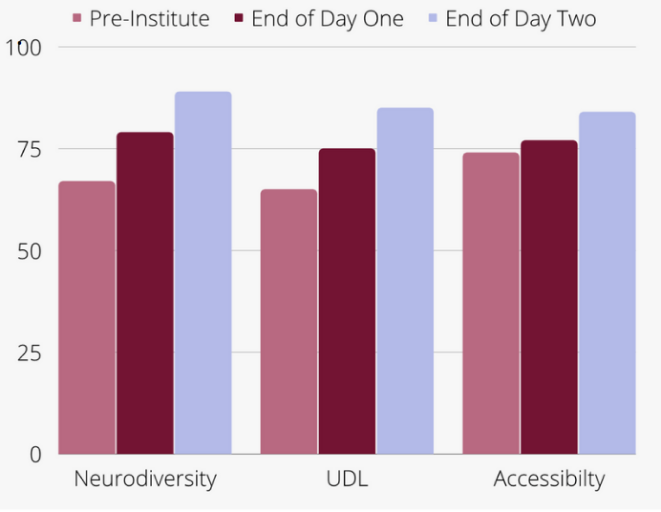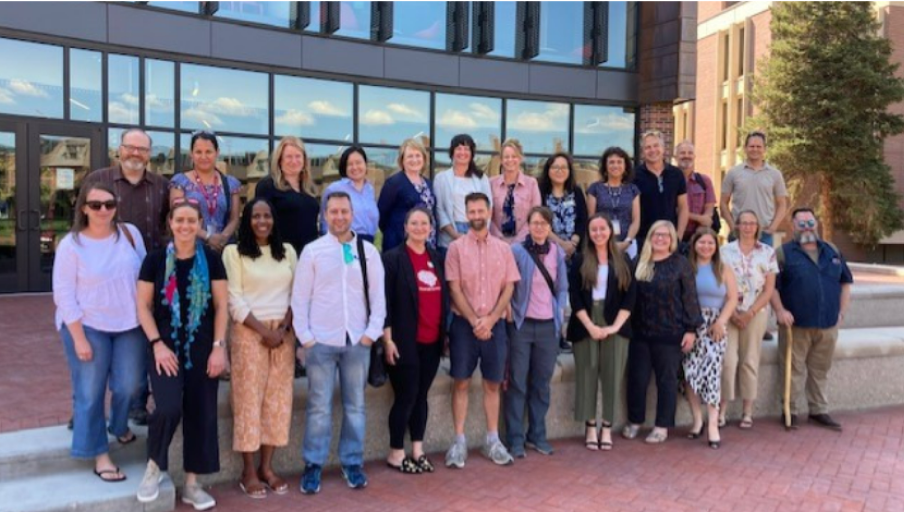Becca Ciancanelli, Director of Inclusive Teaching Practices
Which of the following are true?
- People have “learning styles” and learn best when information is presented to them in the corresponding mode (i.e., visual, auditory, kinesthetic).
- Dyslexia is a visual impairment where readers see letters backwards or in the wrong places.
- The second annual Neurodiversity Institute was a powerful and communal engagement with Universal Design for Learning (UDL).
Faculty who attended the second annual Neurodiversity Institute already know that 1 and 2 are false, and 3 is true. Funded by a generous gift from a DU family whose student faced obstacles in one of his first-year classes, the Neurodiversity Institute was designed to spark change in faculty support for neurodiverse learners in the classroom. Nominated by leadership in their colleges or schools, or recruited by previous participants, attendees engaged and applied literature on neurodiverse student experiences and UDL to improve their courses, curriculum, and pedagogies.
Participants came from seven different colleges and programs across campus. But the impact of this event doesn’t stop with these 22 participants; each attendee committed to a further reflective growth, building on their work at the Institute and making it “public” in their program, field, or other academic community at DU, and proposing a plan for strategic and sustainable change. In this way, UDL values and practices—such as accessibility, choice, engagement, and executive function—will permeate the broader DU pedagogical culture, and inform course and curricular design. As 1 in 5 DU students have a recognized accommodation, this work is vital to student success and equity.

Professionals from the Learning Effectiveness Program (LEP), the Office of Teaching and Learning and the Vice Provost for Faculty Affairs, approached the Institute as a chance to model inclusive and equity-focused practices. For example, they asked participants to engage in an identity exercise to reflect on their current positionality in comparison to their experience as a college student. They offered materials in a variety of mediums, and gave participants time to process and reflect on content in writing and small groups. DU’s own Dr. Lauren McGrath (Psychology) facilitated a session on “Neuromyths,” which offered an introduction to commonly held education myths. Dr. McGrath shared her own research while modeling best UDL practice, inviting faculty to engage their own assumptions about learning. On day two, faculty groups explored UDL principles by diving deep into typical DU classroom scenarios involving learning challenges for neurodiverse students. As seen below, we saw increased faculty confidence in terms of explaining core Institute principles to a colleague.

Interested in learning more? Consider attending the UDL Your Course series offered by OTL in January; contact the OTL for a specialized course review focusing on UDL and accessibility; email LEP to get some feedback on your pedagogy or course design; or connect with a Neurodiversity Institute attendee to learn more about their experience and how it might inform your practice. These faculty committed not only two days of their summers to the vital work of equity for diverse learners, but to advancing a broader culture of support throughout their time at DU. We hope you are willing to join them!
August 2022 Cohort
- Erika Trigoso, College of Natural Sciences and Mathematics
- Kathie Novak, Daniels College of Business
- Sheila Carter-Tod, Writing Program
- Michael Caston, Ritchie School of Engineering and Computer Science
- Brad Benz, Writing Program
- Emily Barter, College of Natural Sciences and Mathematics
- Dinah Loerke, College of Natural Sciences and Mathematics
- Tamara Hannaway, Daniels College of Business
- John Tiedemann, Writing Program
- Angelo Castagnino, College of Arts, Humanities, and Social Sciences
- Matt Hill, Writing Program
- Scott Nichols, College of Natural Sciences and Mathematics
- Ping Qiu, College of Arts, Humanities, and Social Sciences
- Rachel Horenstein, Ritchie School of Engineering and Computer Science
- Kiersten Hillkirk, Sturm College of Law
- Wilfried Wilms, College of Arts, Humanities, and Social Sciences
- Julie Morris, College of Natural Sciences and Mathematics
- Megan Kelly, Writing Program
- Tamra Pearson d’Estree, Josef Korbel School of International Studies
- Jessica Johnson, College of Arts, Humanities, and Social Sciences
- Lina Reznicek-Parrado, College of Arts, Humanities, and Social Sciences
- Kathleen Guerra, College of Arts, Humanities, and Social Sciences
August 2021 Cohort
- Erin Elzi, University Libraries
- Daniel Pittman, Ritchie School of Engineering and Computer Science
- Sandra Dixon, College of Arts, Humanities, and Social Sciences
- Lauren McGrath, College of Arts, Humanities, and Social Sciences
- Sanchari Das, Ritchie School of Engineering and Computer Science
- Prachi Sharma, Ritchie School of Engineering and Computer Science
- Jesse Acevedo, College of Arts, Humanities, and Social Sciences
- Heather Martin, Writing Program
- Salvador Mercado, College of Arts, Humanities, and Social Sciences
- Irina Khindanova, Daniels College of Business
- Effley Brooks, Pioneer Leadership Program
- Lynn Holland, Korbel School of International Studies
- Scott Toney, Daniels College of Business
- Bridget Farrell, University Libraries
- Betsy Leonard, Morgridge College of Education
- Lindsey Reinert, Morgridge College of Education

